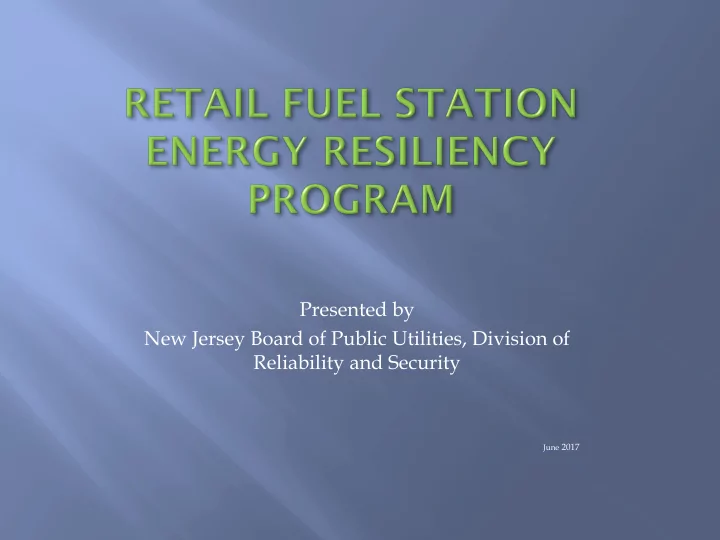

Presented by New Jersey Board of Public Utilities, Division of Reliability and Security June 2017
Reasons for Creating the Program Loss of Local Power ¨ In addition to the petroleum supply chain problems across much of New Jersey during Sandy, approximately 70% of retail gas stations in the northern part of the State lost power and the ability to pump gas. Long Lines at the Pump and Odd-even Rationing ¨ With few retail stations able to pump gas in highly populated areas impacted by Sandy, long gas lines at the pump quickly became a problem necessitating the implementation of odd-even rationing in 12 counties .
¡ The Retail Fuel Station (RFS) Energy Resiliency Program is a voluntary program designed to enhance retail fuel station resiliency in NJ. ¡ The program awards grants to gas station owners for the installation of a quick-connect device capable of connecting to a portable generator or the installation of a permanent back up generator. ¡ The program was funded through Sandy related FEMA funds from the Hazard Mitigation Grant Program (HMGP). ¡ Grants were awarded and applications were approved by the New Jersey Economic Development Authority (NJEDA).
Retail stations with gasoline storage capacity between 18,000 to 35,000 ¨ gallons are eligible for up to $15,000 to purchase and install quick connect technology. Retail stations with gasoline storage capacity greater than 35,000 ¨ gallons are eligible for up to $65,000 toward the installation of an onsite back-up generator. Retail stations must sell both gasoline and diesel fuel. However, if a ¨ station does not sell diesel but is the only available retail station within 1/4 mile of an evacuation route, the station is still eligible.
All applicants were given a deadline of May 1, 2016 to submit all ¨ documents needed for final approval of their project. As of October 2016, a total of 127 retail gas stations participated in ¨ the program and have installed either a permanent backup generator or quick connect device. Ø Total # of generators installed 47 Ø Total # of quick connects installed 80
Recommend
More recommend